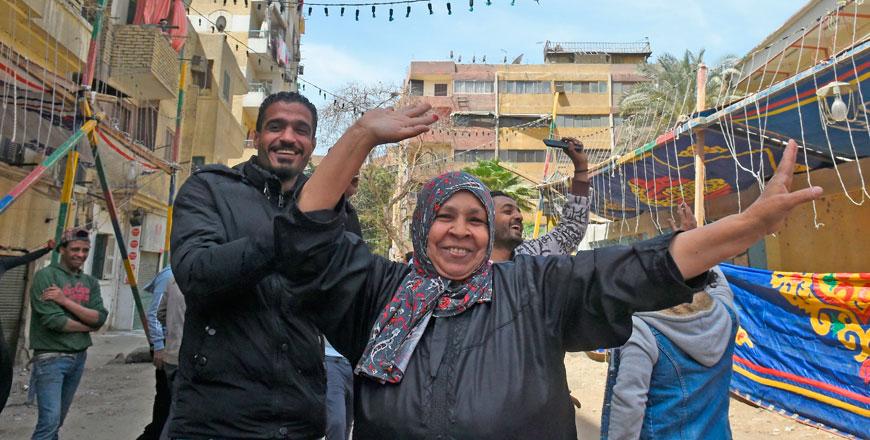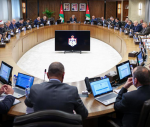You are here
Egypt economy stabilises, prices still need to be tamed
By Reuters - Mar 26,2018 - Last updated at Mar 26,2018

Egyptians dance and celebrate outside a polling station in Imbaba neighbourhood in the capital Cairo's southwestern Giza district on the first day of the 2018 presidential elections on Monday (AFP photo)
CAIRO — Egyptian President Abdel Fattah Al Sisi has revived economic growth and tackled pressing problems in power and gas supply. But as he heads for a second term, he must juggle austerity under an International Monetary Fund (IMF) programme with the need to tame inflation.
Sisi inherited an economy in tatters when he took over the presidency in 2014, requiring aggressive reforms that have largely stopped the rot while hurting most Egyptians through a currency devaluation and withdrawal of some price subsidies.
"He's now at the crossroads that every Egyptian president has found himself in," said Reham Eldesoki, an independent economist long focused on Egypt.
"He needs to push forward on intensive reforms, to move forward in building services and non-oil industry and to make Egypt really investment-friendly."
Sisi's performance in consolidating the gains over the next four years — he is set to cruise to victory in a presidential election which began on Monday — will be watched well beyond Egypt's borders.
European nations particularly worry that any faltering of reforms could worsen unemployment and encourage young Egyptians to cross the Mediterranean illegally, aggravating already sizeable flows of migrants from north Africa.
Also, successive governments' reluctance to devalue the overpriced currency had led to an acute foreign exchange shortage, dampening imports and pricing Egyptian exports out of foreign markets.
Sisi's signature economic achievement so far has been concluding a three-year deal with the IMF in 2016. Under this, the government has raised the price of subsidised fuel to ease the huge burden on the budget, increased value-added tax to 14 per cent and devalued the Egyptian pound against the dollar by more than half.
Many say the reforms were needed to stablise Egypt as it recovers from the chaos and tackles Islamist insurgency. However, the currency reform hit the middle classes particularly hard, while inflation remains high, poverty has increased and unemployment is not going down as quickly as people had hoped.
Economists see some grounds for hope. GDP growth increased to 5.3 per cent year-on-year in the three months to December from a low of 2.1 per cent in 2012/13, according to the central bank.
"I think we should see growth continuing to escalate," said Mohamed Abu Basha, an economist with Egyptian investment bank EFG Hermes. "Tourism has space to recover, and consumption and investment should continue to recover over the next few years."
Energy fix
Egypt, once a net energy exporter, had struggled to get enough fuel to run its antiquated power stations, with the country of 97 million people suffering regular blackouts.
Under Sisi, the government signed construction contracts for new plants and arranged for floating gas terminals to allow more imports. The power shortages were soon brought to a near halt.
Sisi has also acted to break a logjam in gas exploration and development. Likewise, he moved to reduce vast arrears in payments to international energy companies for oil and gas.
This has encouraged them to revive their activities in Egypt, leading to several gas discoveries, including the Zohr field, the largest in the Mediterranean region.
Zohr, operated by Italy's ENI, shipped its first gas at the end of 2017. Other fields that were brought on stream included BP's Atoll and West Nile Delta. The government says the country will be self-sufficient in gas by the end of this year.
Infrastructure expansion
Sisi launched a series of large infrastructure projects designed partly to put Egyptians back to work. Many won praise, such as new roads and expanded electricity capacity.
More controversially, Sisi has begun work on several megaprojects, some of which economists say will produce little immediate return. These include dredging a new branch of the Suez Canal.
Sisi insisted the project be completed within a year, adding to the cost, but because of a worldwide trade slowdown canal revenue was little changed.
He has begun building several new desert cities, including a $45 billion new administrative capital east of Cairo. Egypt has also been negotiating with Russia for a new $20 billion nuclear power plant.
Many investors and economists worry that the army is becoming too involved in these projects and in other ventures, threatening to crowd out private investors.
Austerity measures imposed under the IMF deal pushed annual inflation to 33 per cent in August. By last month, the rate had dropped back to 14.4 per cent.
But more planned measures will make it difficult to bring it down further. The government is widely expected to raise fuel prices again at the start of the new fiscal year on July 1.
"The challenge now will be to get inflation down to single digits," Abu Basha said. "We know that they will eliminate most of the fuel subsidies by the end of the IMF programme in 2019."
Related Articles
CAIRO — Egypt on Thursday said it had a primary budget surplus for the first time in 15 years and said it was committed to paying oil compan
In his first 100 days in office, Egyptian President Abdel Fattah Al Sisi has made a fast start on economic reform: slashing costly fuel subsidies, raising taxes and devising infrastructure projects to secure long-term revenues and ease unemployment.
CAIRO — Egypt's pound plunged in value on Thursday as the central bank floated the currency to address a dollar crunch that threatened to ca

















